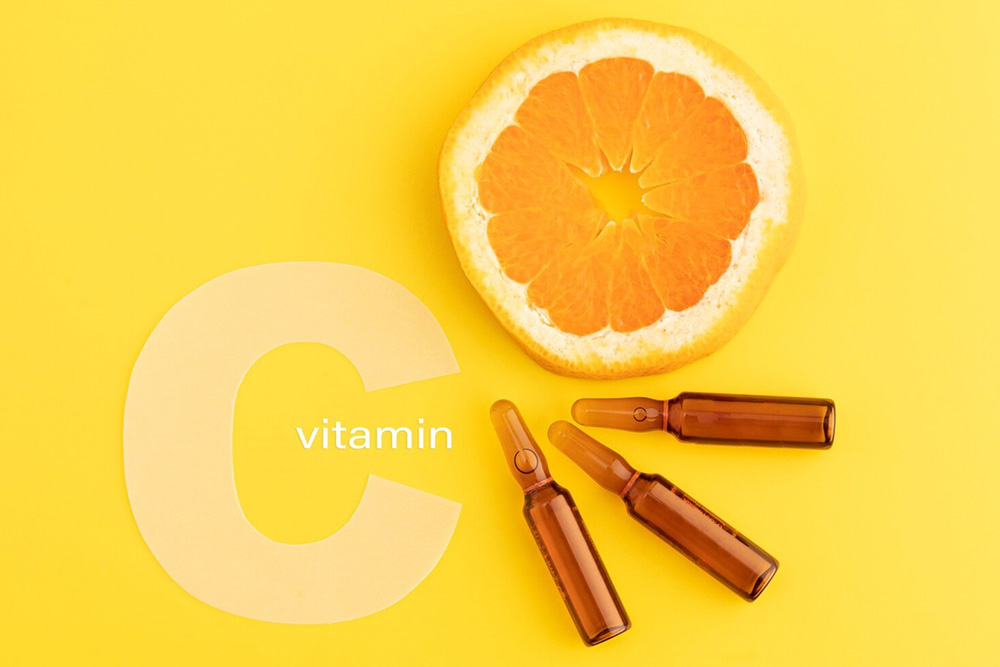Vitamin C - Intravenous

High-Dose Vitamin C: What is it?
Vitamin C, also known as L-ascorbic acid or ascorbate, is an essential nutrient that the human body needs to obtain from food or dietary supplements since it is not produced within the body, unlike molecules like glutathione. Vitamin C can be delivered to the bloodstream through intravenous infusion, reaching very high levels. Studies have shown that these elevated levels of
Vitamin C can induce cell death in cancer cells in laboratory settings.
Severe Vitamin C deficiency in the diet can lead to a disease called scurvy, characterized by symptoms such as extreme weakness, lethargy, easy bruising, and bleeding. The collagen deficiency and thinning of tissues in scurvy due to the lack of vitamin can be corrected with Vitamin C supplementation.
Can High-Dose Vitamin C Affect Cancer Treatment?
The potential effectiveness of high-dose Vitamin C as a treatment for cancer has been under investigation since the 1970s. Ewan Cameron, a Scottish surgeon, collaborated with Nobel laureate chemist Linus Pauling in the late 1970s and early 1980s to explore the possible benefits of Vitamin C therapy in clinical trials involving cancer patients.
Recent surveys among health practitioners in the United States indicate that high-dose Vitamin C is used in cancer treatment to reduce commonly encountered infection and fatigue during the treatment process. It has also been suggested to slow down the spread of cancer cells, including breast cancer.
More than fifty years ago, a study proposed that cancer is a result of changes in connective tissue due to Vitamin C deficiency.
Benefits of High-Dose Vitamin C:
• Antioxidant Properties: Vitamin C acts as an antioxidant, helping to prevent oxidative stress. It works in conjunction with enzymes and plays a significant role in collagen synthesis.
• Administration: High-dose Vitamin C can be administered intravenously or orally. When given intravenously, it can reach much higher levels in the blood than when taken orally.
• Cancer Treatment: Laboratory studies have demonstrated that high doses of Vitamin C may slow the growth and spread of cancer cells in various types, including prostate, pancreatic, liver, and colon cancers.
• Combination Therapy: Some laboratory and animal studies suggest that combining Vitamin C with anticancer treatments could be beneficial, while others indicate that specific forms of Vitamin C may make chemotherapy less effective.
• Tumor Growth Inhibition: Animal studies have shown that high-dose Vitamin C therapy inhibits tumor growth in specific models of pancreatic, liver, prostate, and ovarian cancers, as well as sarcoma and malignant mesothelioma.
• Quality of Life Improvement: Some studies on cancer patients receiving high- dose Vitamin C indicate improvements in quality of life, including physical, mental, and emotional functions. Reductions in fatigue symptoms, nausea, vomiting, pain, and loss of appetite have also been observed.
• Low Side Effects:
Intravenous high-dose ascorbic acid has caused very few side effects in clinical trials.
How to Take High-Dose Vitamin C:
High-dose Vitamin C can be administered either through intravenous infusion or orally, with intravenous administration reaching much higher blood levels than oral intake.
Interactions with Medications and High-Dose Vitamin C:
Drug interaction refers to a change in the way a drug acts in the body when taken with certain other drugs. High-dose vitamin C may render some anticancer drugs less effective when used together. So far, these effects have been observed only in some laboratory and animal studies, and no clinical studies have been conducted in humans to investigate these drug interactions further.
The combination of vitamin C with an anticancer drug called Bortezomib has been studied in cell cultures and animal models. Bortezomib is a targeted treatment that blocks several molecular pathways in a cell, leading to the death of cancer cells. Some studies have shown that orally administered vitamin C makes bortezomib less effective, including against multiple myeloma cells.
However, a study conducted on mice with transplanted human prostate cancer cells did not find that different doses of orally administered vitamin C made bortezomib treatment less effective.
An oxidized form of vitamin C called dehydroascorbic acid has been studied in cell cultures and tumor-bearing animals. Several studies have found that high doses of dehydroascorbic acid may interfere with the anticancer effects of several chemotherapy drugs. Dehydroascorbic acid is found only in small amounts in dietary supplements and fresh foods.
Side Effects and Risks of High-Dose Vitamin C:
- Intravenous high-dose ascorbic acid has caused very few side effects in clinical trials. However, high-dose vitamin C can be harmful in patients with certain risk factors.
- Patients with a history of kidney dysfunction have reported kidney failure after ascorbic acid treatment. Patients with kidney stones should not be treated with high-dose vitamin C.Case reports suggest that patients with a genetic disorder called G-6-PD deficiency are at risk of hemolysis (destruction of red blood cells) and should not be given high doses of vitamin C.
- Since vitamin C can enhance the absorption and utilization of iron in the body, high doses are not recommended for patients with hemochromatosis (a condition where the body takes in and stores more iron than it needs).
- If you have further medical concerns or specific questions about the use of high-dose vitamin C in conjunction with medications, it is advised to consult with a healthcare professional.

